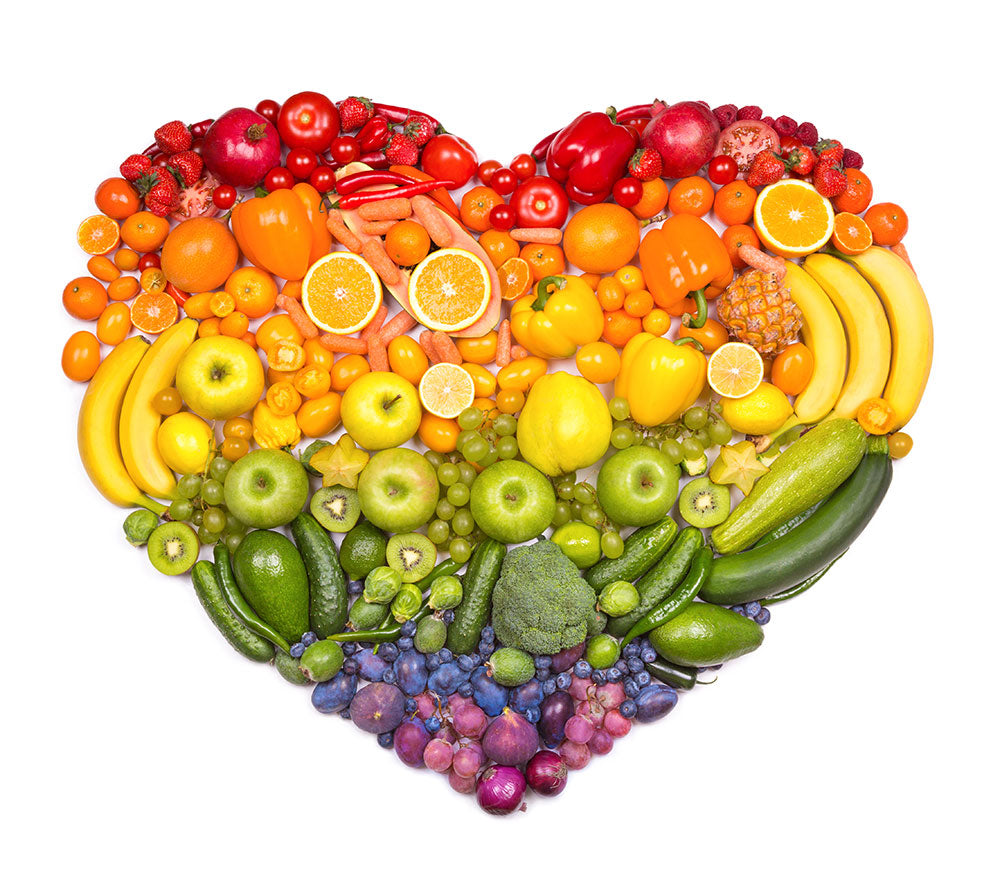What do apples and oranges, aubergines and radishes have in common? They’re all packed full of phytonutrients. These bright coloured compounds are nature’s way of preventing and fighting disease, and if you know how to eat the rainbow in winter, what works for plants can also work for us all year round!
What are phytonutrients?
The word ‘phytonutrient’ simply means plant nutrient, but the term is usually used in nutrition circles to cover those nutrients that aren’t easily classified as vitamins or minerals. Compounds like lutein, lycopene, and beta cryptothanxin, for example, are abundant in fruits and vegetables and are phytonutrient pigments responsible for the wide variety of bright colours of many foods.
From purples to oranges, there’s a splendorous rainbow of colours to be found in the fruit and veg aisle, and every colour means a different array of these beneficial compounds. That said, even some white foods, such as daikon radish or white eggplant, are also packed with these compounds, which can also confer flavour and even aroma. And fresh fruits and veggies are a great source of vitamin C, bioflavonoids, and many minerals and other vitamins too, all of which are phytonutrients!
Health benefits of brightly coloured fruits and veggies
Phytonutrient compounds, including the carotenoid pigments just mentioned, are known to have significant antioxidant activities. These compounds can help protect the skin of fruit against damage from pests and ultraviolet light from the sun and, in humans, confer many of the same benefits.
Epidemiological research (i.e. research across populations) suggests that a diet high in fruits and vegetables is linked to a lower risk of chronic diseases such as diabetes, cancer, and cardiovascular disease (R). Blueberries, for instance, have been linked many times to a decreased risk of diabetes (R).
Other compounds in fruits have been associated with a variety of cardioprotective properties. These include altered cholesterol absorption in the liver, as well as changes in triglyceride biosynthesis, lipoprotein secretion and processing, and inflammation (R).
Eating your veggies, all year round
Given all these benefits, it’s a great idea to include plenty of fruits and vegetables in your diet, especially those that are packed with pigment compounds. This is easy enough to do in summer, with fresh produce stacked high at farmers markets and in the grocery store. In winter, though, it’s a bit trickier to find seasonal produce that’s fresh and healthful, but still totally doable if you know what to look out for.
In February, for instance, the following fruits and veggies are in season in the UK:
- Apples
- Beetroot
- Brussels Sprouts
- Cabbage (purple!)
- Carrots (choose heirloom varieties of different colours)
- Kale (red Russian kale is packed with polyphenols)
- Onions
- Pears
- Purple Sprouting Broccoli
- Spring Greens
By the time March rolls around, you can add in a few early cucumbers, radishes, rhubarb, and watercress, and you may even find some wild sorrel which has a delicious lemony taste and aroma. All of these fruits and veggies offer an abundance of different pigment compounds and other phytonutrients, so there’s no need to skimp even in these darker months.
What if your access to fresh produce isn’t great, though? Don’t worry! Check the freezer aisle for fruits and veggies frozen earlier in the year when they were at their best. Frozen berries make a great dessert or breakfast smoothie, and can be used in muffins and other baked goods all year round. Peas, beans, and other veggies are also excellent when lightly steamed from frozen.
Dried foods are another great way to ensure a varied intake of phytonutrients, whatever the season. Dried figs, prunes, apricots, and even mango, pineapple, and papaya are rich in vibrant phytonutrients. Just be sure to pick those that are unsulphured and unsweetened and watch your intake as dried fruits are much more calorie dense and sweet than fresh fruits.
Other top tips for eating the rainbow
One other great way to make sure to up your intake of beneficial phytonutrients is to avoid peeling fresh fruits and veggies. The peel is where many pigment compounds and other phytonutrients concentrate, forming the first line of defence in plant immunity. Of course, the peel is also the part of foods most exposed to pesticide sprays, so it’s best to buy organic where possible and to wash produce thoroughly before eating.
Don’t dismiss green foods (or brown and white foods)! Spinach, asparagus, broccoli, Brussels sprouts, and even kale and cabbage are a great source of compounds such as sulforaphane, isocyanate, and indole-3-carbinol. These chemicals help inhibit cancer-causing compounds, such as certain kinds of estrogen metabolites and exogenous endocrine disruptors.
As for brown and white foods, members of the allium family such as onions, leeks, and garlic all contain the phytonutrient allicin, associated with immune-supportive and anti-tumour activities. Quercetin and kaempferol are other compounds found in onions, cauliflower, leeks, parsnips, daikon, and mushrooms, so be sure to include these in your diet too.
If you’re looking to include more phytonutrients in your diet, but struggle to get your six to eight servings of fruits and veggies every day, consider a high quality supplement from Higher Nature. Their True Food range is a great insurance policy for those days or weeks where life is just way too busy to keep to a balanced and varied diet packed with fresh wholefoods.
One of our favourites here at Lifestyle Vitamins is Higher Nature’s True Food Supernutrition Plus. This multinutrient formula is packed with more than 26 vitamins and minerals as well as beneficial betaglucans, glutathione, amino acids, and other phytonutrients naturally found in fermented food cultures of Saccharomyces cerevisae.
These nutrients are provided in easily absorbable forms rather than unnecessary mega doses, so they’re gentler on your digestive system. True Nature Supernutrition Plus is designed to support your mind and body, nourishing good health from January through to December.


